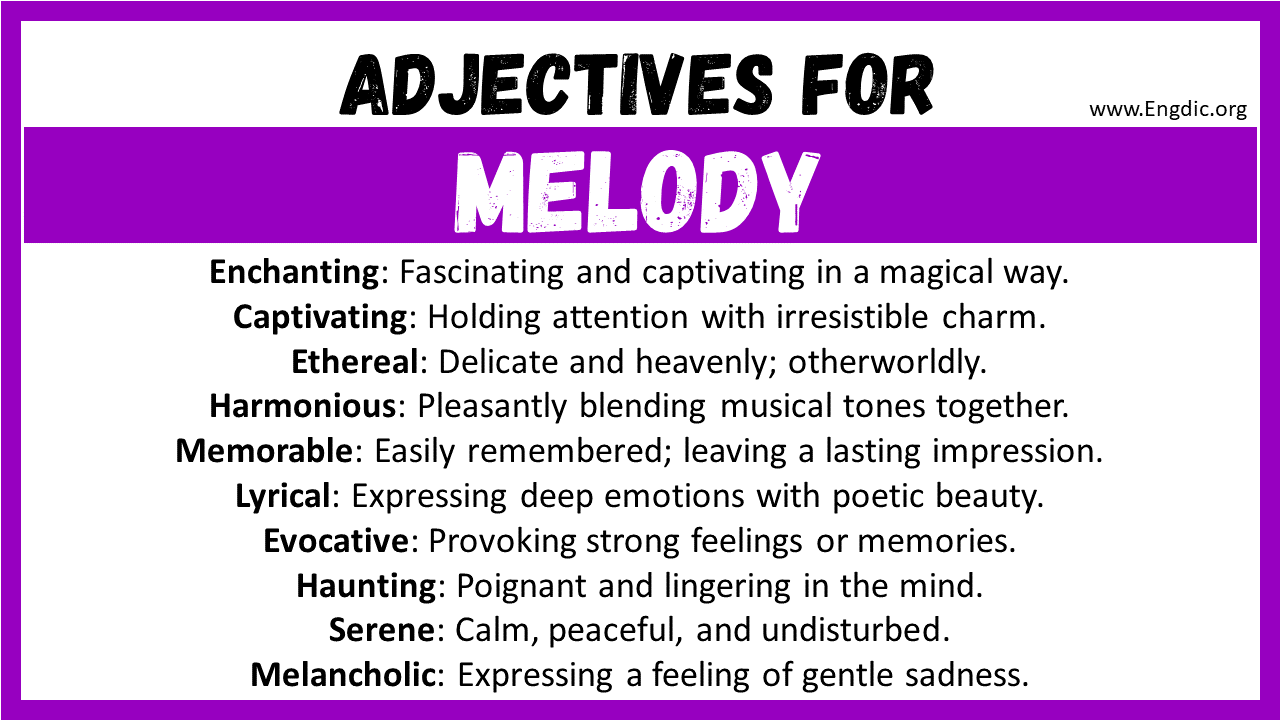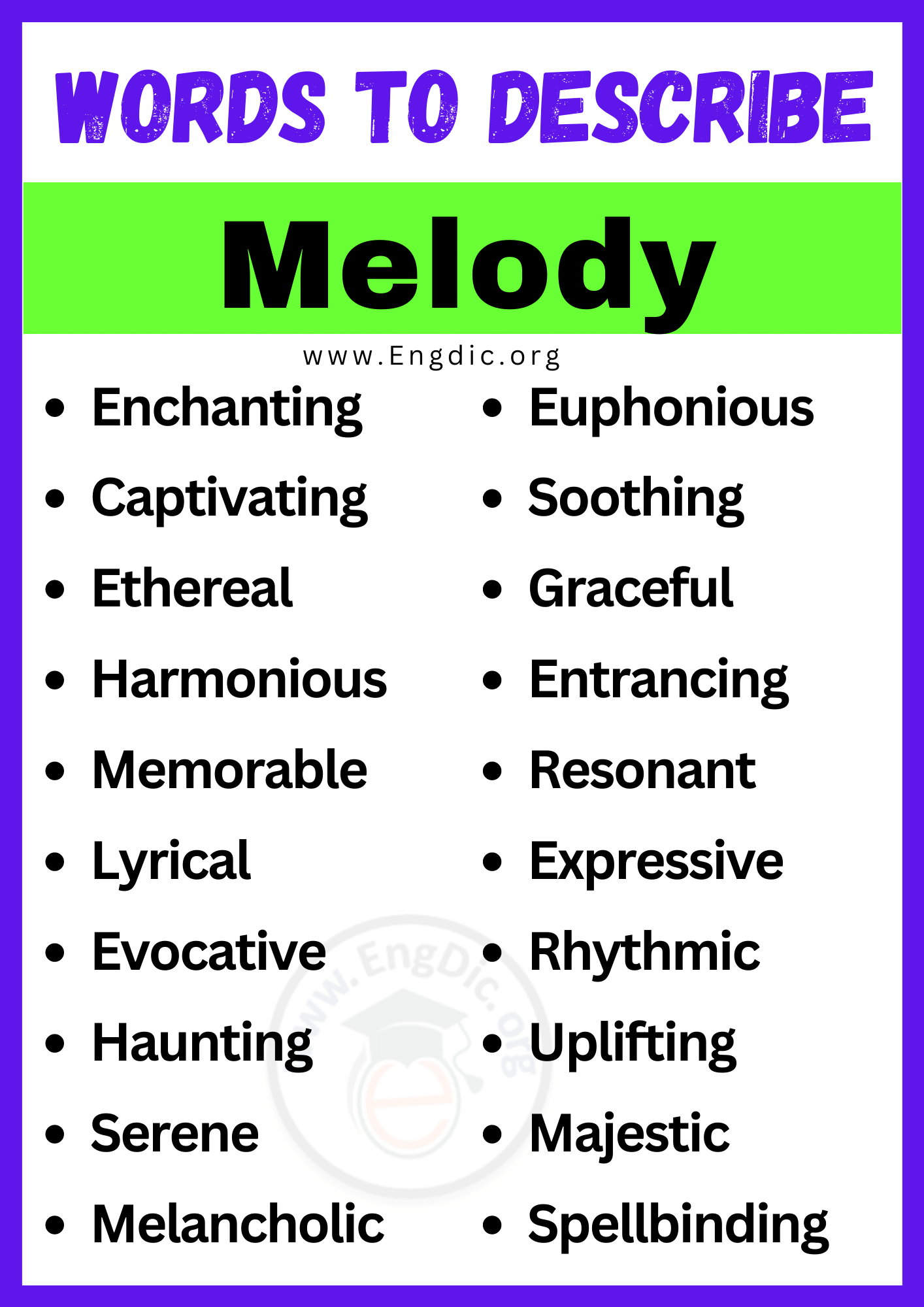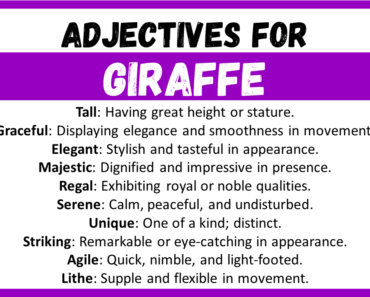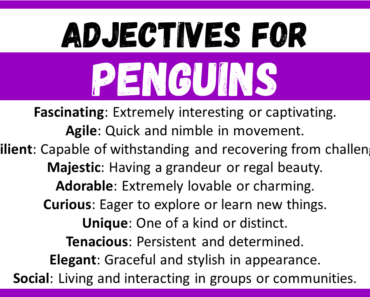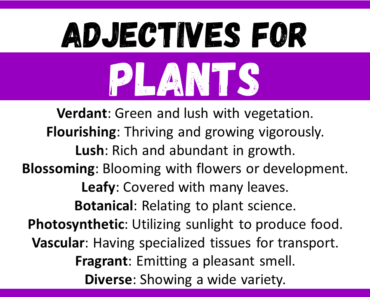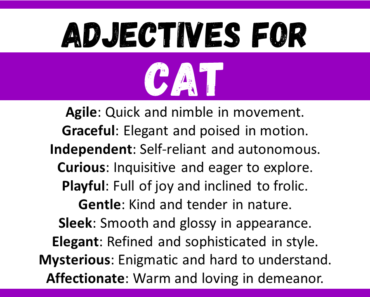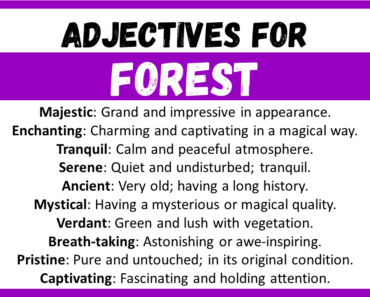Melody is the heart and soul of music. It is the beautiful sequence of musical notes that creates a memorable tune. When we think about describing melody, we encounter a wide range of words that capture its essence. From enchanting and uplifting to haunting and melancholic, melody can evoke various emotions within us. Its rhythm can be soothing, energetic, or even mysterious. With its intricate patterns and harmonious flow, the melody has the power to transport us to different worlds and connect us deeply with the music we love.
Adjectives for Melody
Here are the 20 Most Popular adjectives for melody:
- Enchanting
- Captivating
- Ethereal
- Harmonious
- Memorable
- Lyrical
- Evocative
- Haunting
- Serene
- Melancholic
- Euphonious
- Soothing
- Graceful
- Entrancing
- Resonant
- Expressive
- Rhythmic
- Uplifting
- Majestic
- Spellbinding
Adjectives for Beautiful Melody:
- Enchanting
- Serene
- Captivating
- Ethereal
- Graceful
- Harmonious
- Majestic
- Melancholic
- Rhapsodic
- Spellbinding
Adjectives for Melody in Music:
- Catchy
- Harmonic
- Memorable
- Expressive
- Evocative
- Lyrical
- Melodic
- Rhythmic
- Soulful
- Vibrant
Adjectives for Melody GCSE:
- Complex
- Creative
- Inventive
- Nuanced
- Polished
- Progressive
- Structured
- Technical
- Versatile
- Well-crafted
Words to Describe Melody with Meanings
- Enchanting: Fascinating and captivating in a magical way.
- Captivating: Holding attention with irresistible charm.
- Ethereal: Delicate and heavenly; otherworldly.
- Harmonious: Pleasantly blending musical tones together.
- Memorable: Easily remembered; leaving a lasting impression.
- Lyrical: Expressing deep emotions with poetic beauty.
- Evocative: Provoking strong feelings or memories.
- Haunting: Poignant and lingering in the mind.
- Serene: Calm, peaceful, and undisturbed.
- Melancholic: Expressing a feeling of gentle sadness.
- Euphonious: Pleasing to the ear; melodious.
- Soothing: Calming and comforting in nature.
- Graceful: Exhibiting elegance and fluidity in movement.
- Entrancing: Captivating and mesmerizing.
- Resonant: Deep and rich in tone or meaning.
- Expressive: Conveying strong emotions or thoughts.
- Rhythmic: Characterized by a regular beat or pattern.
- Uplifting: Inspiring feelings of joy and positivity.
- Majestic: Grand and dignified in a powerful way.
- Spellbinding: Holding attention as if under a magical spell.
Example Sentences for Melody Adjectives
- The enchanting melody transported me to a mystical realm.
- Her voice had a captivating melody that held the audience spellbound.
- The choir’s performance created an ethereal melody that echoed through the hall.
- The orchestra played a harmonious melody that resonated in the concert hall.
- The song’s memorable melody lingered in my mind long after it ended.
- His lyrical melody stirred deep emotions within me.
- The haunting melody of the piano evoked a sense of melancholy.
- As I listened, a serene melody filled the room, calming my spirit.
- The melancholic melody carried a sense of longing and nostalgia.
- The symphony orchestra delivered an euphonious melody that delighted the audience.
- The gentle and soothing melody eased my troubled mind.
- The ballet dancer moved with graceful elegance, perfectly complementing the melody.
- I found myself entranced by the entrancing melody playing softly in the background.
- The resonant melody of the cello touched the depths of my soul.
- Her expressive melody conveyed a wide range of emotions.
- The rhythmic melody made me want to dance to its beat.
- The singer’s powerful voice uplifted my spirits with its uplifting melody.
- The orchestra’s performance was truly majestic, filling the concert hall with grandeur.
- The spellbinding melody left the audience in awe and wonder.
- The melodic tunes of the flute danced through the air with delicate beauty.
Explore More Words:
FAQ’s
How to describe melody in writing?
To describe a melody in writing, focus on its characteristics such as its mood, rhythm, tempo, dynamics, and overall emotional impact.
What are the 3 types of melody?
The three types of melody are (1) conjunct, with a smooth and connected sequence of notes; (2) disjunct, with leaps and intervals between notes; and (3) static, with repeated or sustained notes.
What are the principles of melody?
The principles of melody include aspects such as pitch, rhythm, contour, interval, repetition, variation, and phrasing. These elements shape the structure and flow of a melody, creating its unique character and musical expression.
